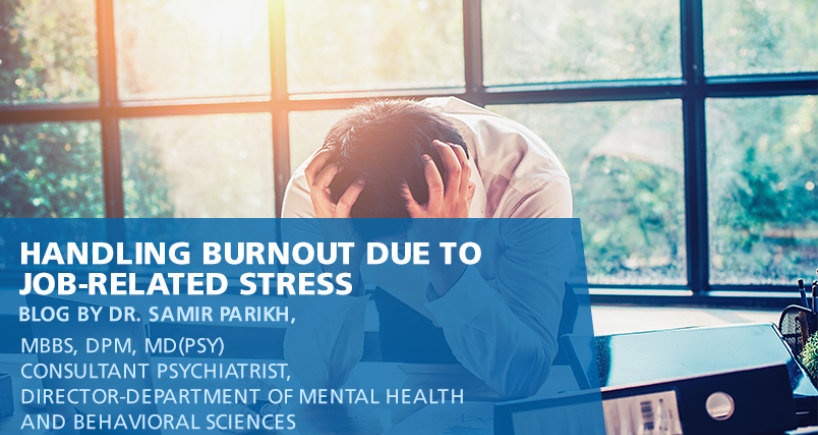
Handling Burnout Due To Job-Related Stress
Job-related stress is an increasing concern for many in today’s time. There are various reasons for job-related stress. For some it occurs because of long working hours while for others it might be the tight deadlines or the nature of interpersonal relationships at the workplace. Job burnout occurs because of exposure to prolonged workplace stress which the individual is not able to manage. Job burnout leads to exhaustion at the mental, emotional, and physical levels. The three major signs to identify job burnout are -
- Emotional exhaustion: The individual experiences physical and emotional depletion that occurs because of continuous job-related stress in the person’s life.
- Cynicism: The individual undergoing job burnout develops a distant or indifferent attitude towards work and other colleagues and the workplace.
- Low personal accomplishment: The person develops a tendency to negatively evaluate the worth of one’s work and overall has a feeling of low personal accomplishment.
Job burnout, if not taken care of on time, hampers the person’s day-to-day functioning and results in poor quality of life overall. Here are some of the strategies that a person can adopt to prevent and handle job related stress and burnout effectively.
- Take short breaks
Job-related stress can often deplete motivation and energy. This can further result in an impact on moods, causing a person to feel low, sad, irritable, or angry. Taking short breaks between the work schedule helps in refreshing the mind and body. This could include taking a walk, having a small chat with colleagues, or getting something to eat or drink. This not only helps in breaking the monotony of work but also enables the person to continually find the energy to keep moving forward and doing the work.
- Build social support
Strong social support helps one get through the stress in life. It provides the comfort and surety that your colleagues, peers, and family are there for you to support you in your difficult times. Reach out to your supervisor and share with them your concerns. Sharing how you think and feel about the stress that you are facing and patiently listening to others will help you to feel relieved and connect better with others.
- Take out time for recreational activities
With the daily life hustle of getting the work done and meeting deadlines, peopleoften fail to take out time for things that they enjoy doing. For some, it could be painting while for others, it could be gardening. Take out time in your daily schedule for any recreational activity that you enjoy doing. It will help boost your morale and keep your mood uplifted.
- Maintain a proper sleep schedule
Job-related stress, when not managed, interferes with the person’s ability to have a relaxed and refreshing sleep. It can also lead to insomnia, a serious condition in which the person faces difficulty in initiating and maintaining sleep. Research shows that one of the reasons for job burnout is the lack of adequate sleep every night. Here are some of the tips for maintaining sleep hygiene:
- Maintain a proper sleep schedule and ensure that you take at least 6-8 hours of sleep every night. Follow this schedule on a regular basis.
- Avoid using any electronic device like a mobile or laptop or watching television for at least an hour before sleeping.
- Take a bath before you sleep.
- Read or listen to light, relaxing music once you are in bed.
- Avoid consuming caffeine at bed time.
- Seek professional help if needed
When you feel that you are not able to manage the stress on your own or with the support of others, it is best to seek professional help. Stress management techniques, supportive counseling, psychiatric medication and other effective strategies help in building a happy, healthy, and productive life for the individual.
To know more about the Fortis Workplace Mental Health Initiative write to us at [email protected] or call on +918588807193.
Follow on Telegram at https://t.me/fortismentalhealth for more on Workplace Mental Health.



















